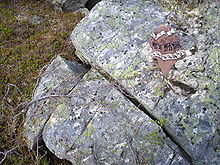Frostbite
The gelifraction or gelivation is a process consisting of the fragmentation of rocks due to the stresses produced by the freezing of water contained in their cracks, fractures and pores. Rainwater, snowmelt or dew is introduced into the cavities of the rocks. The gelifraction can give rise to scree and rock glaciers.
From the early 20th century until the mid-1980s, it was thought that frostbite was due to the expansion of the water freezing into ice. However, several scientists maintain that although water expands when it freezes, this expansion can be accommodated by the expulsion or compression of air in the rock or by a push out of the ice itself without breaking the rock.
Gellifraction occurs especially in polar, subpolar and high mountain areas, where oscillations above and below zero degrees are frequent. Gelifraction has also been considered one of the weathering agents in deserts.
Contenido relacionado
Microorganism
Dietary fiber
European Economic Community
